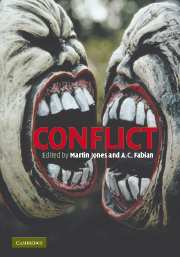Book contents
- Frontmatter
- Contents
- List of figures
- Acknowledgements
- Introduction: Arenas of conflict
- 1 Intrapersonal conflict
- 2 Sex differences in mind
- 3 Why apes and humans kill
- 4 The roots of warfare
- 5 Conflict in the Middle East
- 6 Observing conflict
- 7 Conflict and labour
- 8 Life in a violent universe
- Notes on the contributors
- Index
6 - Observing conflict
Published online by Cambridge University Press: 11 August 2009
- Frontmatter
- Contents
- List of figures
- Acknowledgements
- Introduction: Arenas of conflict
- 1 Intrapersonal conflict
- 2 Sex differences in mind
- 3 Why apes and humans kill
- 4 The roots of warfare
- 5 Conflict in the Middle East
- 6 Observing conflict
- 7 Conflict and labour
- 8 Life in a violent universe
- Notes on the contributors
- Index
Summary
Years ago, as a member of the National Youth Theatre, I recall watching rehearsals of Richard III from the wings as the Alarums and Excursions of Bosworth Field were being conjured up by an over-enthusiastic scrum of lads laying about each other with sword and mace at the back of the stage. The director was bellowing above the din, ‘Boys and girls, please do not kill each other. This is drama. No one need die.’
Conflict of all kind runs through Shakespeare's plays, many of the plots turning on it – emotional, historic, martial. He knew how to keep the audience's attention. And at the final curtain, the audience left the theatre and returned to a world which they knew was uncertain and shaped by war, but was incalculably different to the world of the stage.
Television also presents a kind of stage. We can witness both comedy and tragedy. However, it is as if the back wall of the stage dissolves every so often – and the real life that is walking past is thrust centre-stage, on-screen. Such is the technique of television that it is not always obvious what is reality and what is fiction. I have only to refer you to the constant enquiries to the BBC of those people who wish to have a drink in the Queen Vic pub in EastEnders.
- Type
- Chapter
- Information
- Conflict , pp. 106 - 124Publisher: Cambridge University PressPrint publication year: 2006



